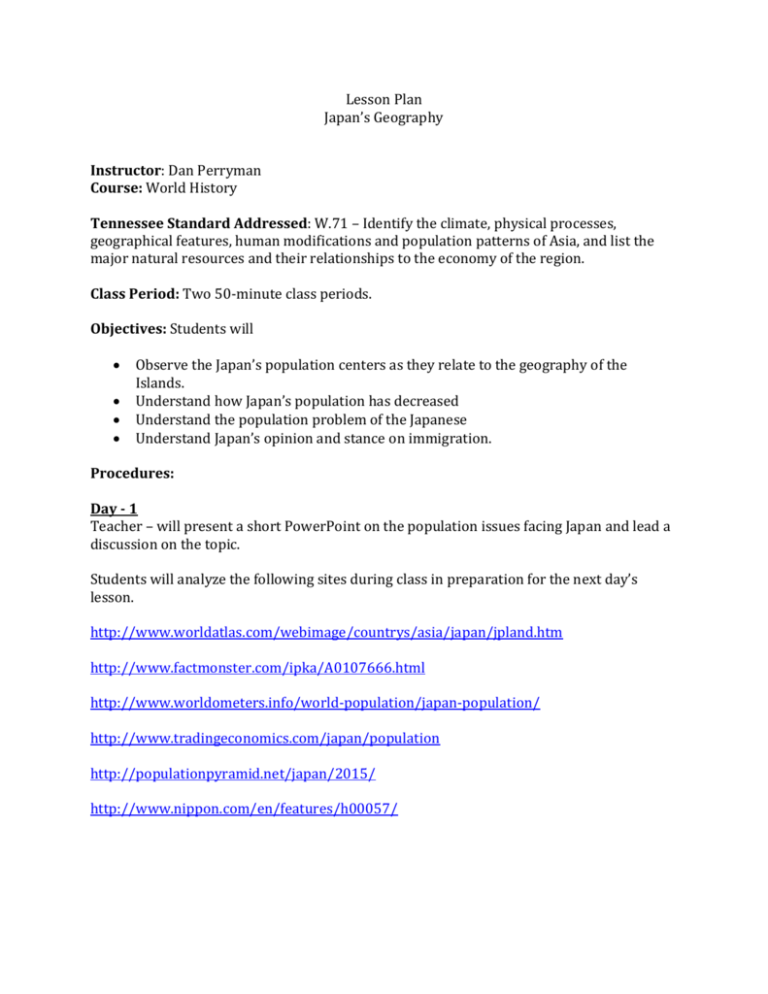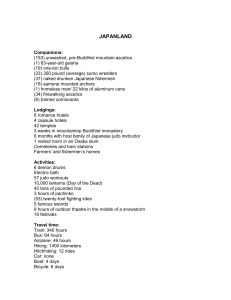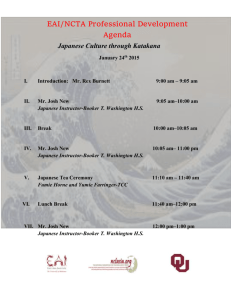Japan`s Geography
advertisement

Lesson Plan Japan’s Geography Instructor: Dan Perryman Course: World History Tennessee Standard Addressed: W.71 – Identify the climate, physical processes, geographical features, human modifications and population patterns of Asia, and list the major natural resources and their relationships to the economy of the region. Class Period: Two 50-minute class periods. Objectives: Students will Observe the Japan’s population centers as they relate to the geography of the Islands. Understand how Japan’s population has decreased Understand the population problem of the Japanese Understand Japan’s opinion and stance on immigration. Procedures: Day - 1 Teacher – will present a short PowerPoint on the population issues facing Japan and lead a discussion on the topic. Students will analyze the following sites during class in preparation for the next day’s lesson. http://www.worldatlas.com/webimage/countrys/asia/japan/jpland.htm http://www.factmonster.com/ipka/A0107666.html http://www.worldometers.info/world-population/japan-population/ http://www.tradingeconomics.com/japan/population http://populationpyramid.net/japan/2015/ http://www.nippon.com/en/features/h00057/ Students will split into five groups. Each group will be given a specific problem to analyze and then develop through discussion a plan to solve this particular dilemma. 1. 2. 3. 4. 5. Japan’s stance on immigration, how should it be addressed? Japan’s dwindling work force – what are some steps that could be taken? What are some steps the Japanese could take in order to elevate the birthrate? Is the geography of Japan a factor in population control? If so why? What are some factors that influence people to immigrate to Japan? Day -2 Students will continue in groups. Each group will analyze one of the following questions and present their findings: 1. How does Japan have enough food for the population density of their country? Does Japan rely on imports? Which country imports the most food to Japan? 2. Does population density affect the price of land? Do research on land and home prices in Japan. Compare those prices to those in our area. 3. Does population density affect land use? What is the primary use of land in Japan? How does the dense population affect the land use? 4. How has population density and the need for transportation affected land use in Japan? Have bullet trains improved transportation in Japan. How are these trains useful? 5. Does the density of the population affect automobile transportation? What are some aspects of Japanese life that are affected by automobile transportation? 6. Does Population density affect education? What is the average enrollment in a Japanese school? How is higher education affected by population density? Does the population density encourage students to seek education in other countries? 7. How does the dense population of Japan affect recreation? Does Japan have similar recreational activities that the US has or is Japan limited by the available land usage? 8. What impact will increasing immigration have on the population density? Each group will use laptops in class to research the above questions. Students will work together to form answers to the above questions. Each group will share their findings and discuss there findings. Assessment: 1. In class discussion 2. Students will be given a written response question on how population density affects and area of Japanese life. Resources: All of the following sites would be useful sources for the development of worksheets and activities dealing with population density. http://apps.gcsc.k12.in.us/blogs/jstewart/files/2010/09/PopulationWorksheets.pdf http://www.geographypods.com/1-population-growth--distribution.html http://afe.easia.columbia.edu/japan/japanworkbook/economics/exercis.htm#ge5











